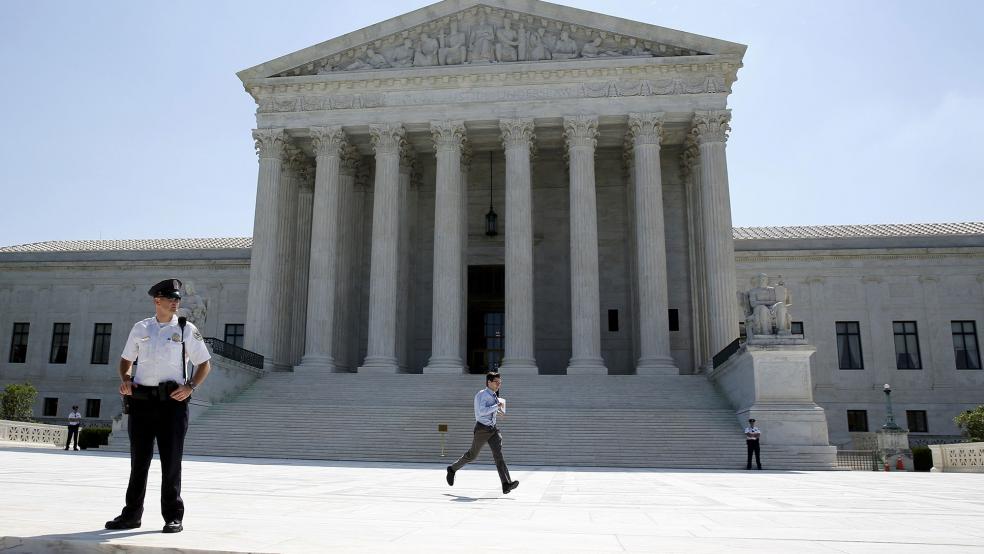Anybody who thinks they can game out the political consequences of the coming fight over filling the seat of deceased Supreme Court Justice Antonin Scalia is seriously deluded. However, one thing that is manifestly clear is that it puts a handful of Republican Senators in a serious political bind.
In November’s election, there will be no fewer than four, and possibly six, incumbent Republican senators facing close races in either traditionally Democratic states or states where neither party holds a decisive numerical advantage. No matter how things play out, those senators will face a dilemma when President Obama, as he has indicated he will, nominates a judge to succeed Scalia.
Related: Two-Thirds of the US Government Basically Won’t Work for the Next Year
The Republicans in potential jeopardy are Mark Kirk of Illinois, Roy Blunt of Missouri, Richard Burr of North Carolina, Kelly Ayotte of New Hampshire, Rob Portman of Ohio, Pat Toomey of Pennsylvania, and Ron Johnson of Wisconsin.
Of the six, some are in more danger than others. Johnson and Kirk are running in traditionally blue states and will likely face well-known Democratic challengers. Ayotte, in purple New Hampshire, is facing a challenge from Democratic Gov. Maggie Hassan. Portman, in purple Ohio, faces former Democratic governor who was voted out of office in the Republican wave election in 2010. Burr and Blunt, while probably safe, are both from states that have elected Democratic senators in recent memory.
By all accounts, there will be pressure on Senate Majority Leader Mitch McConnell from within the party to deny any Obama nominee a vote at all, and if that’s the path he chooses, each of those senators will be forced to take a political position on what Democrats will, accurately, view as an unprecedented act of political obstruction.
On the one hand, it would be unprecedented in modern history for a Supreme Court seat to remain open for more than a year, with a qualified nominee waiting in the wings. It would almost certainly lead to a number of 4-4- rulings by a ideologically divided court, meaning that important judicial decisions would be left unresolved until they could be reheard.
Related: Republicans Gear Up for a Bitter Fight Over Scalia’s Supreme Court Seat
Some of the incumbents have already taken positions on the question, and seem ready to assume that political risk.
Ayotte, in a statement, said, “We're in the midst of a consequential presidential election year, and Americans deserve an opportunity to weigh in given the significant implications this nomination could have for the Supreme Court and our country for decades to come. I believe the Senate should not move forward with the confirmation process until the American people have spoken by electing a new president.”
According to CNN, Johnson was a little more artful, saying in an email “I strongly agree that the American people should decide the future direction of the Supreme Court by their votes for president and the majority party in the US Senate," but falling short of a direct call to completely halt the nomination process.
The others, Kirk, Toomey, Burr, and Blunt, had been silent up to early Monday afternoon.
Related: With Scalia’s Death, What Happens to the Supreme Court Now?
However, completely shutting down the nominating process isn’t the only option available to McConnell. He could allow a nomination to be considered by the Judiciary Committee and bring it to the floor for a vote, with the assumption that the Republicans’ majority would prevent confirmation.
However, that has the potential to turn into a political minefield as well.
It is a virtual certainty that Obama will nominate a centrist judge with ironclad credentials – possibly someone like US Circuit Court of Appeals Judge Sri Srinivasan from the District of Columbia. Srinivasan was approved for that seat unanimously, 97-0 in 2013, and every one of the Republicans in the Senate facing reelection in November except James Lankford of Oklahoma (who was not seated until 2015) voted for him.
Opponents would demand that candidates who flipped their votes on Srinivasan explain themselves – something that would be made extra awkward by the fact that he would be the first Asian-American to serve on the high court.
How big an impact the pending elections and the Supreme Court nomination battle will have on each other, obviously, remains to be seen, but there’s no doubt that it will make for great political theater.





